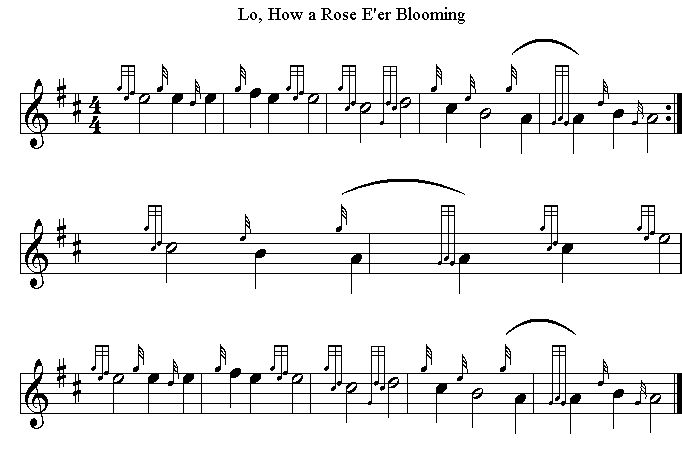 |
||||

Best viewed in
|
Lo, How a Rose E'er Blooming "Es ist ein Ros entsprungen" (lit., "A rose has sprung up"), is a Christmas carol and Marian Hymn of German origin. It is most commonly translated in English as "Lo, how a rose e'er blooming", and is sometimes known as "A Spotless Rose" or "Behold a Rose of Judah". The rose in the text is a symbolic reference to the Virgin Mary, and the hymn makes reference to the Old Testament prophecies of Isaiah which in Christian interpretation foretell the Incarnation of Christ, and to the Tree of Jesse, a traditional symbol of the lineage of Jesus. Because of its prophetic theme, the song is popular during the Christian season of Advent. The hymn has its roots in an unknown author prior to the 17th century. It first appeared in print in 1599 in the Speyer Hymnal and has since been published with a varying number of verses and in several different translations. It is most commonly sung to a melody which was harmonized by the German composer Michael Praetorius in 1609. The hymn was originally written with two verses, which express the fulfilment of the prophecy of Isaiah, foretelling the birth of Jesus. It emphasizes the royal genealogy of Jesus and Christian messianic prophecies. The first verse describes a rose sprouting from the stem of the Tree of Jesse, a symbolic device that depicts the descent of Jesus from Jesse of Bethlehem, the father of King David. The image was especially popular in medieval times and it features in many works of religious art from the period. The second verse of the hymn, written in the first person, then explains to the listener the meaning of this symbolism: that Mary, the mother of Jesus, is the rose that has sprung up to bring forth a child, who is represented as a small flower ("das Blümlein"). The text affirms that Mary is a "pure maiden" ("die reine Magd"), emphasising the doctrine of the Virgin birth of Jesus
Lyrics
|
|||
